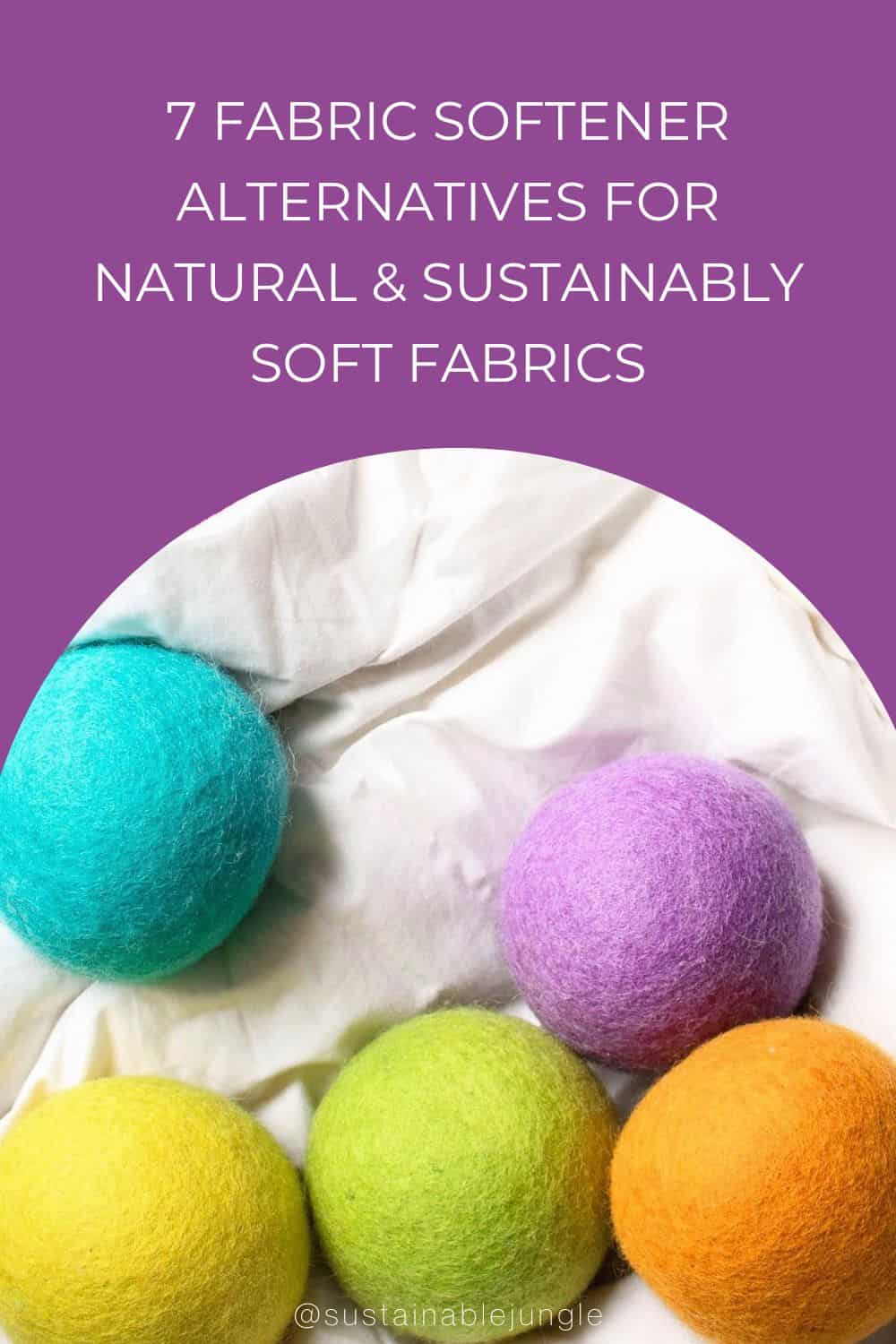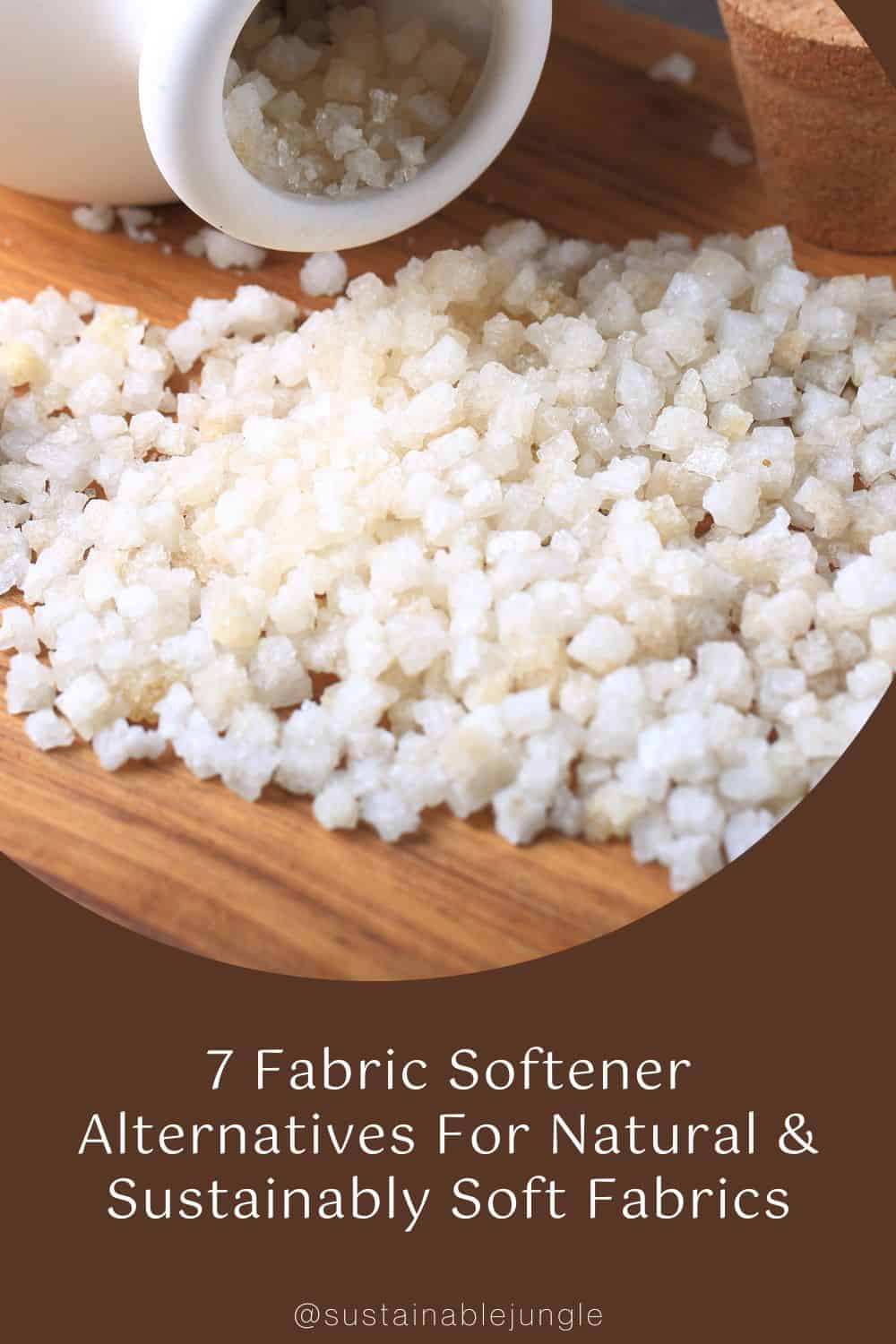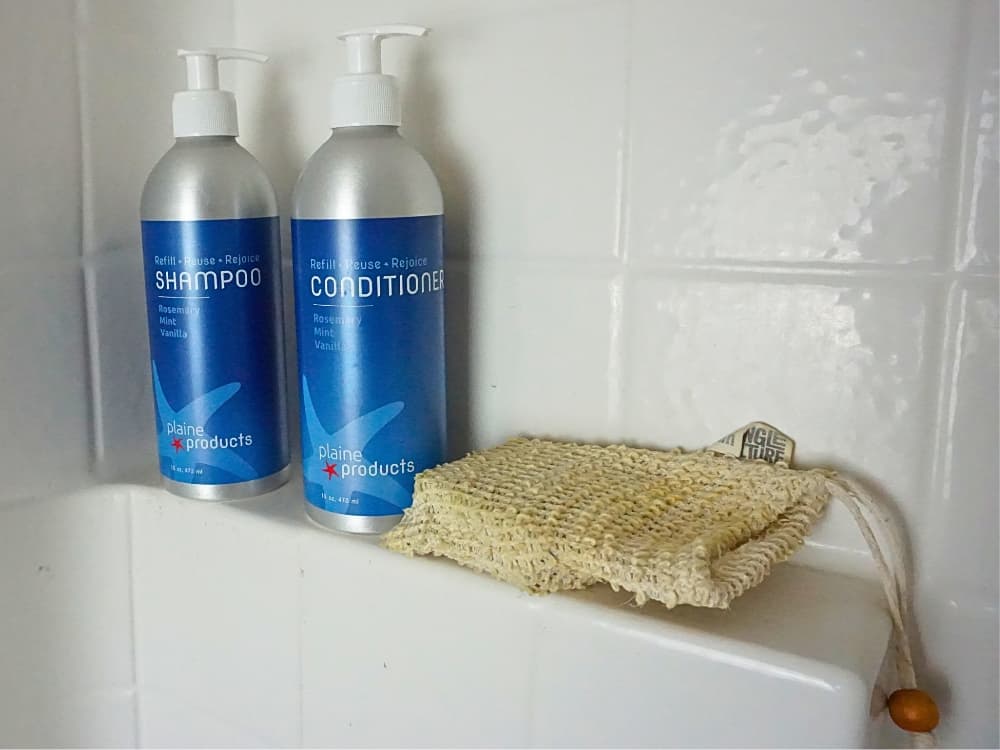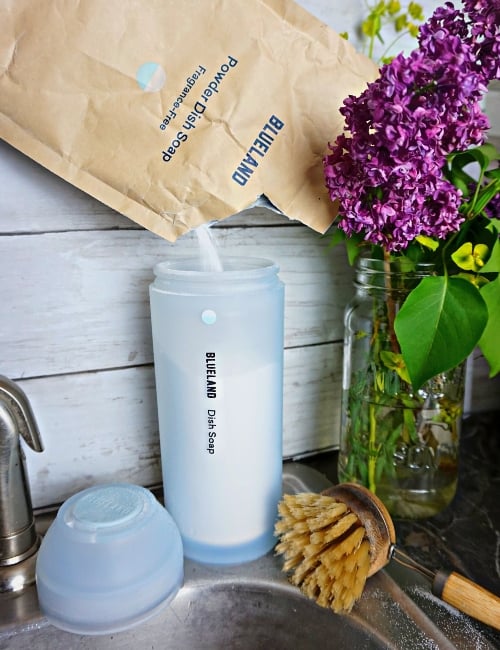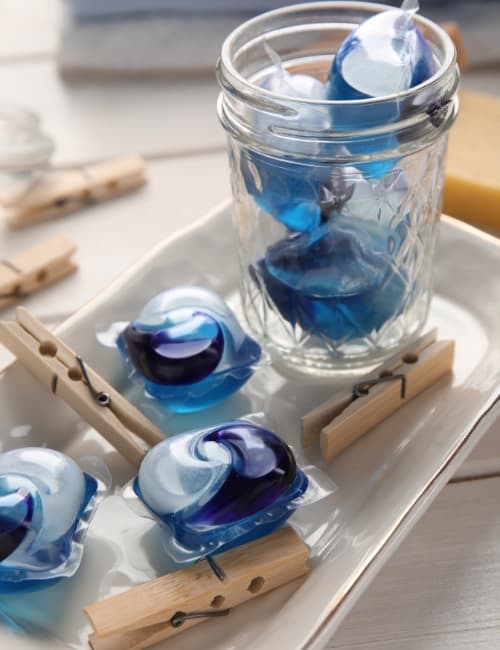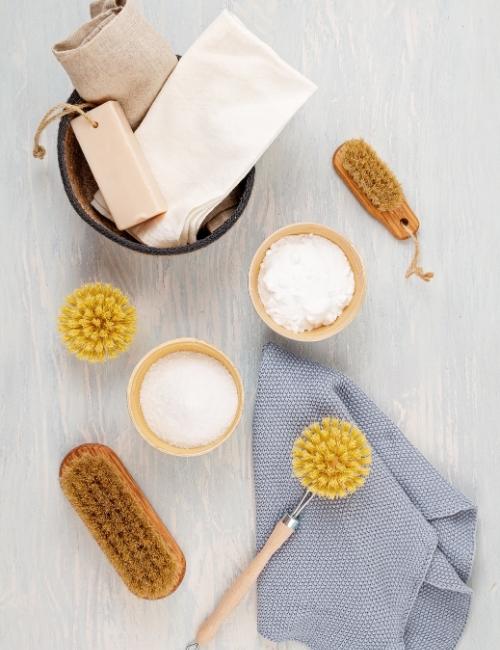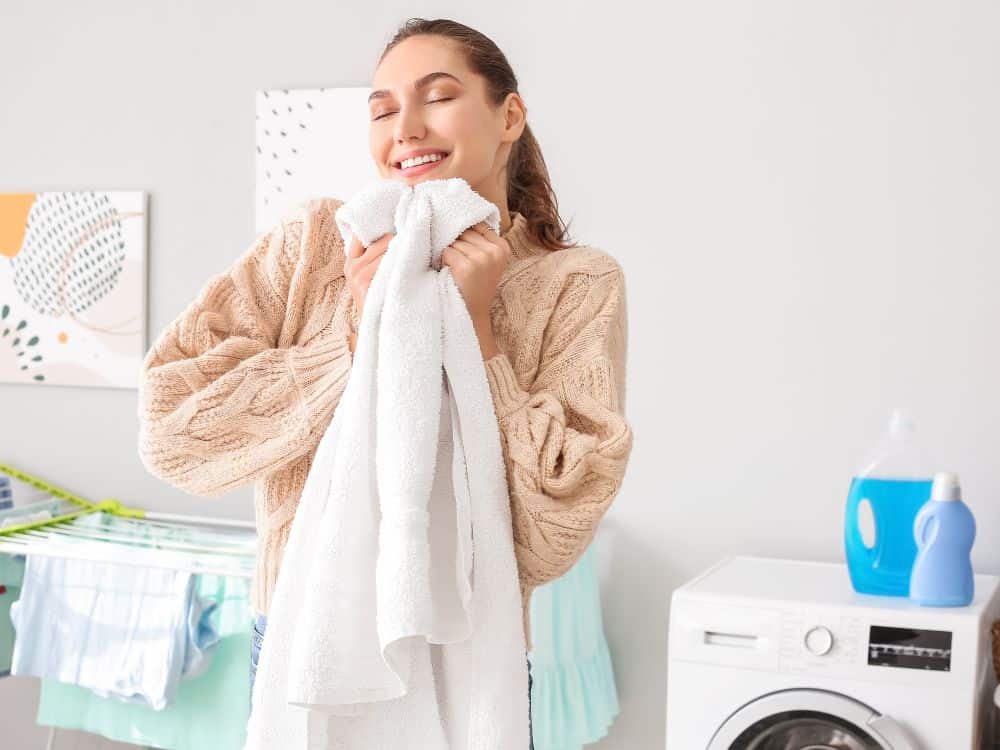
7 Fabric Softener Alternatives For Natural & Sustainably Soft Fabrics
Newsflash: fabric softeners are dangerous to the environment, our health, our clothing, and our machines.
So why do so many people still think they need to rely on them for soft and static-free laundry?
And if you don’t, what can you use instead of fabric softener?
While you could certainly opt for a more eco-friendly fabric softener, there are numerous natural fabric softener alternatives to keep your spin cycle moving in the right direction.
And anything that helps us stay on top of those piles of dirty laundry—without dirtying the planet in the process—is surely a very good thing.
With the fabric softener market projected to increase to a $19.7 billion worth by 2026, we’re hoping these eco-friendly alternatives to fabric softener help curb the enthusiasm for harsh chemicals and plastic overload in favor of natural and non-toxic alternatives.
Make sure to tumble (dry) to the bottom of this article to learn the harrowing truths of conventional fabric softener and to see how we found the very best alternatives to liquid fabric softener.
Everything we recommend to you on Sustainable Jungle is independently researched and we ask all brands to confirm their claims. To avoid waste, we test products on an as needed basis. This post contains affiliate links. If you buy something through our links, we may earn a small commission. Learn more about why we do this here.
The Full List Of Alternatives To Fabric Softener
- Dryer Balls
- Baking Soda
- Vinegar
- DIY Fabric Softener Crystals
- Hair Conditioner
- Essential Oils
- Aluminum Foil
1. Dryer Balls
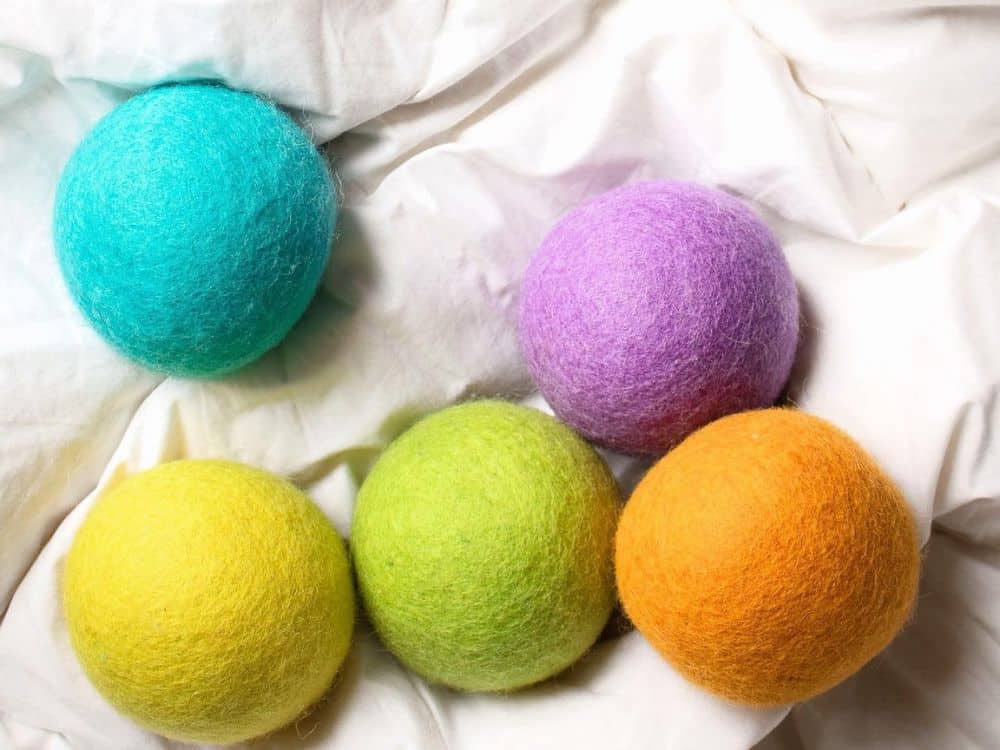
Using Dryer Balls As An Alternative To Fabric Softener Sheets
If you’re looking for a dryer fabric softener alternative, try tossing in a few dryer balls.
Made of compostable materials like wool, bamboo, and hemp, these are the most popular dryer sheet alternative in use today.
While wool dryer balls aren’t vegan, they are a popular alternative because of their high absorbency, longevity, compostability, and success at reducing static cling, softening clothes, and reducing dryer time by up to 40%.
Given that the average US family washes more than 300 laundry loads every year, this method is an excellent way to conserve energy and reduce the environmental and financial impact of laundry day.
Friendsheep’s wool dryer balls will leave you counting sheep and extra money saved with their highly absorbent wool balls. They’re made from ethically sourced, organic and fair trade Leaping Bunny-certified cruelty-free New Zealand wool.
Or you can try Superbee’s 100% organic New Zealand wool dryer balls (in a set of three)—good for about 1000 loads. We love this one.
For a vegan natural softener for clothes, check out Dragonfly Dryer Balls’s organic hemp and bamboo dryer balls, which come in regular and activated charcoal.
As opposed to single use sheets, fabric softener sheet alternatives like these are designed to last for about 1,000 loads.
Tennis balls also work in a pinch, but because these are made of synthetic fabrics, they won’t absorb water (nullifying the energy saving benefits) and will still shed microplastics. Opt for a plastic-free dryer balls if you can.
2. Baking Soda
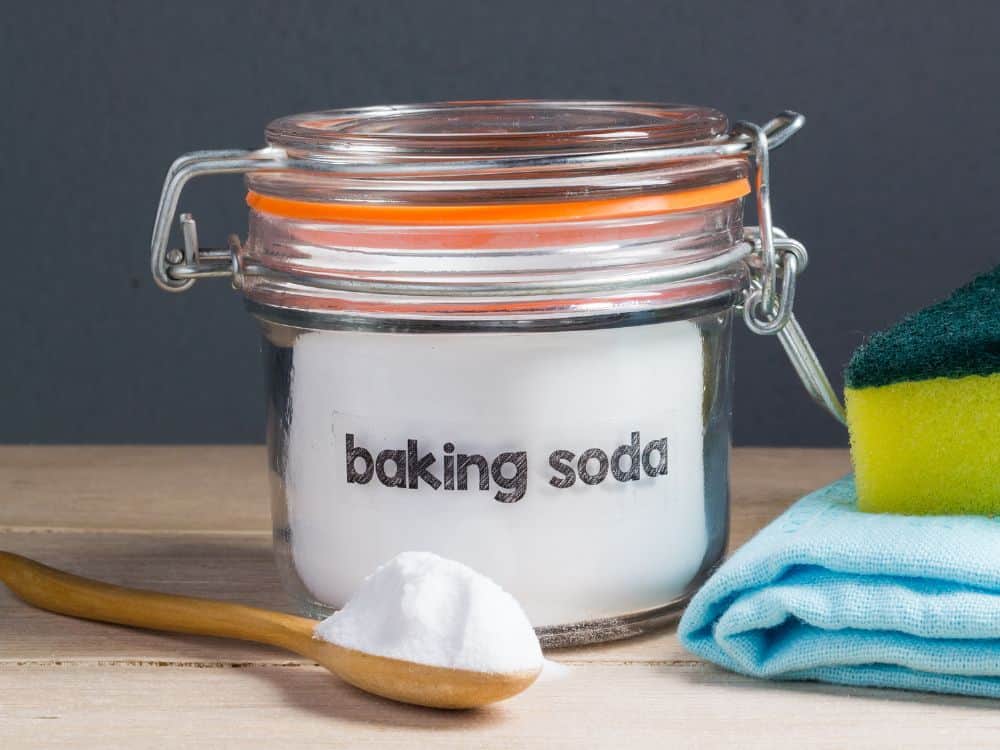
Using Baking Soda As A Natural Fabric Softener Alternative
When it comes to the best fabric softener substitute, homemade is a reliably sustainable choice.
Baking soda, it turns out, has more uses than whipping up some treats in your non-toxic bakeware and eating up bad smells in the back of the fridge.
Just add 1/4 to 1/2 a cup of baking soda to your wash cycle before you add your eco-friendly laundry detergent. Wash at your normal settings.
Thanks to scent, baking soda is a natural fabric softener alternative that actually works.
As an alkali substance, baking soda corrects water’s pH levels to reduce bacteria, eliminate funky smells, and lift dirt from deep in the fibers. In turn, this also softens fabric.
If you’re also in need of an added fresh scent, add 3–5 drops of essential oils with your baking soda to the rinse cycle.
3. Vinegar
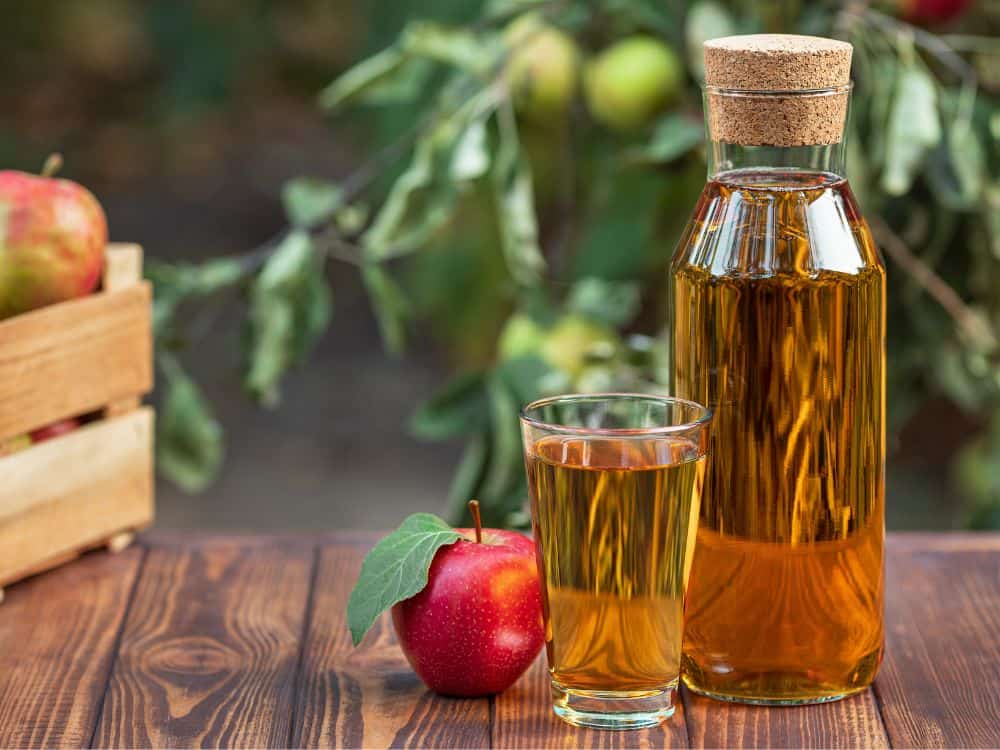
How to Use Vinegar As Liquid Fabric Softener Alternatives
Whether you’re making your own eco-friendly cleaning products or a fabric softener alternative, vinegar is a simple solution for anything and everything around the house.
If you’re looking for affordable alternative fabric softeners using something you probably already have, apple cider or plain white vinegar can work wonders on your laundry.
Don’t worry, the vinegar scent quickly disappears in the wash, so your clothes won’t emerge smelling like salad!
To use this method, add 1/2 cup of vinegar to the fabric softener dispenser in the washing machine just before the final rinse cycle to leave clothes soft and free of static cling.
If you want your clothes to have a mild fresh scent, add 3–5 drops of essential oils into the fabric softener compartment at the same time.
Since vinegar is easily purchased via bulk stores online or locally and has multiple uses outside laundry, it’s one of the best alternative for fabric softeners for low waste living.
Important heads-up: don’t use vinegar if you’ve heavily bleached garments—vinegar and bleach are dangerous if inhaled together, which defeats the point of your non-toxic fabric softener substitute.
4. DIY Fabric Softener Crystals
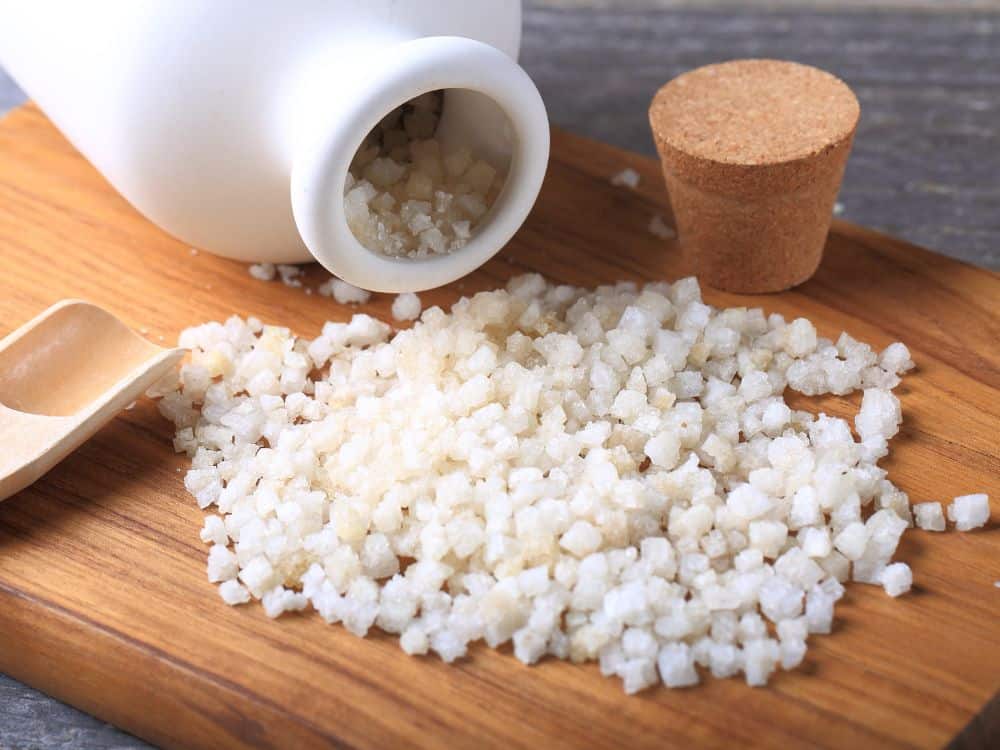
How To Make Fabric Softener Crystals As a Substitute For Fabric Softeners
If you’re wondering what to use instead of fabric softener that you might already have, look no further than your zero waste kitchen.
Simply mix a cup of table salt and essential oil.
If you know you have soft water, Epsom salts also work. However, their minerals further harden already hard water. The same does not apply for plain table salt.
As for essential oils, anything will work, but these are some popular scents:
- Lavender: promotes rest and relaxation, plus it’s soothing for sensitive skin.
- Lemon and sweet orange: bright, uplifting, fresh, and clean.
- Bergamot: woodsy, warm, and cozy. Great in winter months.
- Jasmine: a natural mood booster that also alleviates anxiety and depression.
A large laundry load may call for up to a 1/2 cup for very hard water—or only 1–2 tablespoons for a small load and softer water.
You can play around with dosages, since this solution won’t damage the clothes or build up sediment in your washing machine.
You can also pre-mix large batches and store in reusable jars right next to your natural laundry detergent.
5. Hair Conditioner
Using Conditioner As A Substitute For Fabric Softener
If you’ve already made the switch to zero waste shampoo and conditioner, hair’s to ya!
While you should never use fabric softeners as hair conditioner, the reverse is an effective minimalist home hack.
Just as conditioner softens your hair, it works as a natural softener for clothes.
Here’s how to make this simple DIY recipe to soften clothes:
- Mix two cups of natural liquid conditioner (like that from Everist or Plaine Products) and six cups of hot water. Stir until smooth. Try not to shake the mixture–it becomes too foamy.
- Add two cups of white or apple cider vinegar.
- Optionally, you can add essential oils (just a few drops)l for an extra refreshing scent.
- Pour into a reusable container to store.
- When using, add one-quarter cup of your mixture in the washing machine before you add laundry detergent. You can also add to your machine’s fabric softener dispenser.
Clothes will be static-free, soft and freshly scented—just like your hair after a long shower!
6. Essential Oils
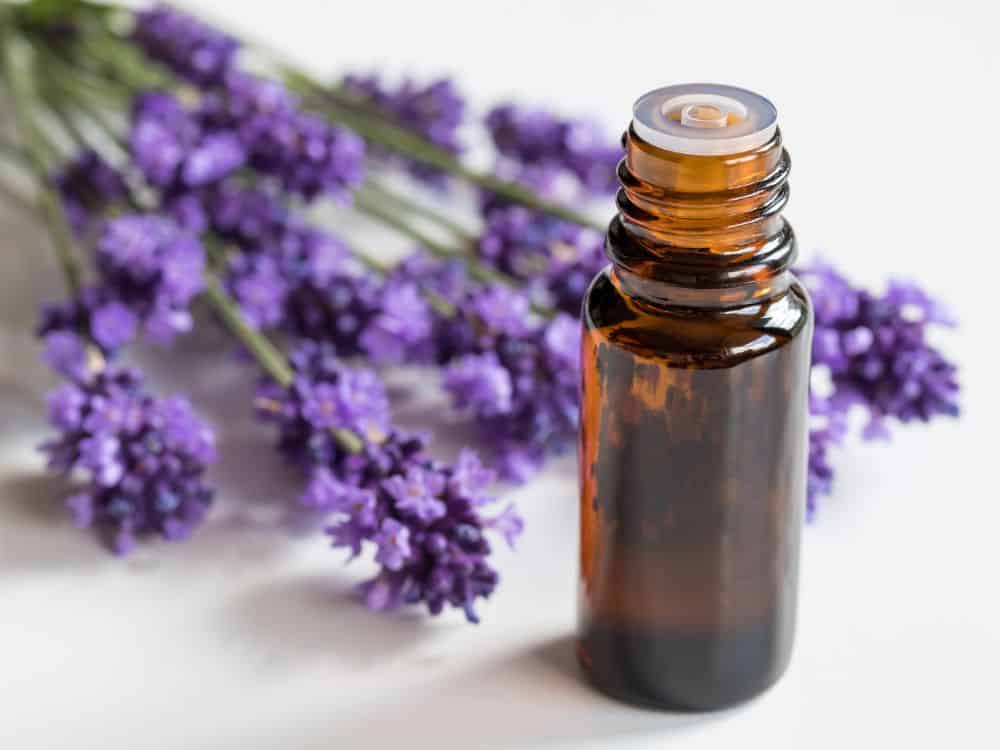
Essential Oils As Non-Toxic Alternatives to Fabric Softener
What is the best homemade fabric softener?
If you’re a scent-obsessed person, it might be anything that makes your laundry smell lovely—without the harmful VOCs and allergens associated with synthetic fragrances.
Essential oils are a simple and natural alternative to fabric softeners.
By adding one or a few different essential oils to the rinse cycle during laundry, they’ll leave you with softer clothes that smell great.
When shopping for essential oils, we encourage you to buy organic oils free of any harmful chemicals or synthetic ingredients. EmpireSquid Organics is one option.
Any essential oil that is healthy for skin will be good to add to your washing cycle. Lavender, tea tree oil, eucalyptus, bergamot, citrus, rosemary, peppermint, rose, or jasmine are all recommended.
Add a maximum of one tablespoon per laundry load (less if you have sensitive skin) when there’s already water in the washing machine; If the oil goes directly on garments, it may stain.
This means this method alone is only suitable for top load eco-friendly washing machines, since you won’t be able to open a front loading machine before the rinse cycle.
If you have a front loader, try adding essential oils to your dryer balls or homemade crystals instead.
Alternatively, mix one or two droppers of oil with two cups of vinegar and store in a spray bottle. Shake and spray into the dryer before you add wet clothes.
Pro-tip: spritzing them on your ironing board cover can also reduce static cling.
7. Aluminum Foil Balls
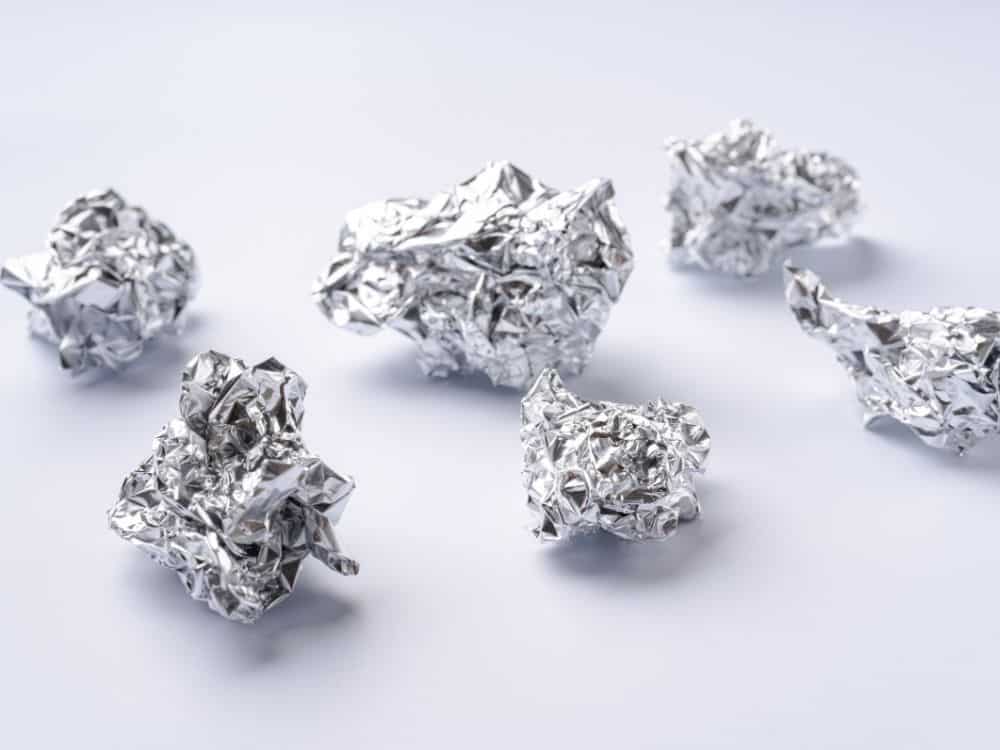
Using Aluminum Foil Balls As Fabric Softener Alternatives For Static
Even if you’ve switched to beeswax wraps and other non-disposable plastic-free food storage, aluminum foil is a fabric softener ball alternative.
It’s also the cheapest and easiest way to manage clothing static.
Just crumple up aluminum foil into the size of two or three tennis balls, and throw in during the drying cycle with your wet clothes.
The negative ions from the aluminum foil discharge static, which means your clothing won’t have any whatsoever.
You can reuse foil balls for dozens (maybe hundreds) of tumble dry cycles. Say goodbye forever to toxic single-use dryer sheets.
Did you know we Have a Newsletter?
We cover the latest in sustainable living, fashion, zero waste, beauty, travel, finance and more…
Why Choose Fabric Softener Substitutes?
So, do you really need fabric softener?
Nope, not even a little bit. The best alternative fabric softener is no softener.
Synthetic fabric softener is not only bad for the environment, but also your skin, your health, your machines, and your clothing.
Let’s spin (cycle) through the history and facts about chemical fabric softener to understand just how important it is to say “no” to this product.
Fabric Softener History
Historically, liquid fabric softener first emerged in the early 1900s, because back then clothing dyes left predominantly cotton fabrics with a harsh, stiff feeling.
Early formulas were more natural and made from corn, olive or tallow oil mixed with water.
By the 1960s, advances in modern chemistry were made, and Procter and Gamble splashed onto the scene with their newfangled formulas for fabric softener that included ingredients like quats.
But quats, along with synthetic fragrances and harsh chemicals, are damaging not only to our planet, but also our skin, health, clothing, and machines.
Fabric Softener Chemical Overload
Quats are known to trigger asthma and are likely toxic to the reproductive system.
Liquid fabric softeners also often has hormone disrupting phthalates to disperse scent and toxic musk (such as galaxolide), which can accumulate as toxins in the body.
Synthetic fragrances in regular fabric softener can likewise cause allergies, skin irritations, dermatitis, respiratory issues, and possible reproductive damage. While more research is needed, studies indicate that synthetic fragrances possibly also create health issues when vented into the air outside, particularly for asthmatics.
Then there are the preservatives and colors. Methylisothiazolinone is a strong skin irritant and allergen, and glutaral is known to trigger skin allergies and asthma. These common fabric softener chemicals are also fatal for marine life when they get washed down the drain and back into waterways.
The artificial cherry (color) on top is the synthetic colors—like carcinogenic D&C violet–added into store-bought fabric softeners for no real reason.
Environmental Dangers Of Chemical Fabric Softeners
Not only do the plastic jugs take 500+ years to decompose and contribute to enormous landfill waste and microplastics, but the liquid softener itself kills the environment and marine life.
An alarming 1 billion laundry jugs are used in North America annually, and more than half end up in landfills.
On top of that, the quats we spoke of earlier are sometimes plant-based, but usually they are an animal byproduct, meaning that your store bought fabric softeners aren’t vegan or cruelty-free.
Fabric Softener Damage To Clothing & Washing Machines
If that wasn’t enough to make you swap for an eco-friendly alternative, fabric softeners are also bad for your clothing and your laundry machines.
This is because the same ingredients that are meant to lubricate your clothing also gum up your sustainable activewear and sustainable lingerie, along with your machines.
According to one laundry expert interviewed for Consumer Report, his number one tip for laundry was to ditch the fabric softeners—and disposal dryer sheets, while you’re at it.
But remember: using no fabric softener doesn’t actually mean you can’t soften clothes.
You can simply opt for a replacement for fabric softener: natural alternatives, dryer balls, DIY solutions, and common household items.
Final Thoughts On Natural Alternatives to Fabric Softener
We’ve already overloaded the planet with plastic and toxic chemicals to the point that home cleaning routines have sullied the Earth.
But don’t get down(y) because these Downy ball alternatives give you the option to make every load of dirty laundry a little bit cleaner—for your personal home and our collective one.
Zero waste cleaning goals aside, these affordable fabric softener alternatives are one super easy way to reduce your carbon footprint at home.
The next time friends or family ask “How can I soften my clothes without fabric softener?” be sure to share this article for a lighter environmental load on laundry days far and wide.
Pin these:
